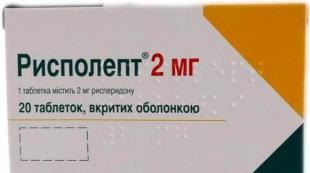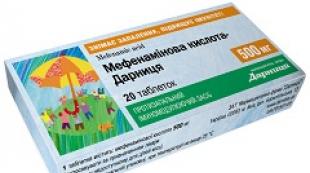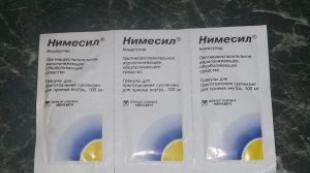Signs of blood thickening. Thick blood - what does it mean, causes and methods of treatment. Thick blood: what to do
Drowsiness, general malaise and rapid fatigue are the first and main symptoms of increased blood viscosity.
With further deterioration of health, shortness of breath, increased heart rate, and tingling in the heart area occur.
Frequent accompanying manifestations include blurred vision, memory, headaches and dizziness, irritability, temporary loss of coordination, and bloating.
Such conditions serve as an alarming signal for the disease PWS (hyperviscosity syndrome), which, when intensified and in a chronic form, has an extremely severe consequences. If you have suspicions, it is better to immediately consult a doctor, undergo diagnostics, identify the causes and take health measures as early as possible.
Diagnostics

Causes and counteraction to SPV
 Blood thickening is associated with various diseases, unhealthy habits, and side effects of medications. Common reasons:
Blood thickening is associated with various diseases, unhealthy habits, and side effects of medications. Common reasons:
temporary acute PWV occurs when intestinal infections by type of dysentery as a result of diarrhea and vomiting, dehydrating the body; The main remedy against acute dehydration: drink a lot of water with a small addition of salt ("coarse sulfur", without harmful additives);
also, temporary acute PWS occurs with extensive burns - the body produces a lot of leukocytes and platelets, suffers from an excess of damaged protein dissolving in the blood, the person feels feverish, he sweats; We also recommend lightly salted water;
chronic overeating of sweets, potatoes, noodles and the resulting acidification and slagging of the body, diabetes; recovery consists of changing the menu with the abandonment of “refined” and easily digestible carbohydrates, replacing them with natural and incompletely digestible carbohydrates that have cleansing properties (for example, vegetables and fruits with pulp, seaweed, krill paste);
various diseases, causing disturbances in the functioning of the adrenal glands and kidneys; diagnosis and treatment of these diseases eliminate the cause of blood thickening;
diseases accompanied by an increase in protein in the blood, as well as erythremia (excessive production of red blood cells and other blood elements);
hepatitis of different nature; we treat “jaundice” - we get rid of the problem;
pancreatitis of the pancreas; We often eat in moderation and undergo treatment;
diuretics, contraceptives, hormones, Viagra and other drugs - reconsider, are they really necessary?
Occasionally, thrombophilia and varicose veins are indicated among the causes of PWS; we believe that these are effects, not causes.
A person with increasingly thick and sticky blood naturally increases the risk of strokes, heart attacks, heart attacks and high blood pressure, blood clots, and sometimes varicose veins (more often in women).
Treatment and prevention
 When treating thick blood, you should not rely only on medicinal preparations and procedures. Lifestyle and proper nutrition are very important.
When treating thick blood, you should not rely only on medicinal preparations and procedures. Lifestyle and proper nutrition are very important.
Yes, when severe forms PWS, when there are already problems with the heart, blood vessels, after a stroke, intense physical activity is contraindicated, but small ones are mandatory and very useful. It's worth trying to do at least a few regular activities, exercises, and blood naturally will become more fluid, adding many good quality years to life!
It is useful to drink 8-10 glasses of liquids daily (unsweetened teas, water, preferably infused with shungite or silicon, spring water). Avoiding fine white salt harmful additives, consume rock or other salt in moderation.
Restrictions:
exclude or limit chokeberry, leaf and green vegetables, bananas, as well as buckwheat, soy products, products with trans fats (margarine, mayonnaise, chips), marinades;
It is better to replace white bread and loaf, pasta with gray and black bread, porridge;
avoid salty foods and smoked meats, overcooked fatty foods;
give up smoking and alcohol;
Sugar and sweets literally thicken and make the blood sticky - they are avoided.
What to do? Taking aspirin?
 The problem can strike when you are quite young, in your forties and fifties. This is a known fact that has led to the widespread use of daily aspirin to thin the blood. However, after publication in JAMA (Journal of the American Medical Association) 2012; 307:2286-94 this practice is increasingly being criticized.
The problem can strike when you are quite young, in your forties and fifties. This is a known fact that has led to the widespread use of daily aspirin to thin the blood. However, after publication in JAMA (Journal of the American Medical Association) 2012; 307:2286-94 this practice is increasingly being criticized.
Then a study of more than 370,000 patients found that people taking low-dose aspirin daily were 55% more likely to have serious brain or intestinal bleeding (hemorrhage). The actual risk of aspirin-induced bleeding was 5 times greater than previously estimated. Serious risks even when taking small doses of aspirin force many, if not to abandon aspirin-containing drugs, then to reduce the doses taken and turn to “natural treatment.”
In modern medical practice, aspirin is the leader in terms of universal treatment thick blood is disputed by at least two drugs - Nattokinase-Serrapeptase and Warfarin or Coumadin ( herbal preparation from sweet clover, blocks the action of vitamin K, which promotes blood clotting). Aspirin-containing “Agrenox”, “Heparin”, “Enoxaparin”, “Plavix” continue to be used.
The course of taking medications based on aspirin and sweet clover is supposed to be accompanied by a certain diet; they are all quite effective, but are dangerous due to intestinal bleeding.
Black stool indicates bleeding in the intestines.
There are also more “gentle” ways of recovery and treatment. Among the specialized drugs: “Aspercard”, “Curantil” and “Eskuzan” are recommended to improve the condition of veins, and “Cardiomagnyl” is recommended for regular use by elderly patients to prevent heart attacks.
Diets consisting of natural products, with a constantly updated range.
Previously, bloodletting was widely used to thin the blood; now it is usually avoided or replaced by donation. By the way, it's normal a white man blush; usually the absence of blush indicates either anemia and anemia, or, on the contrary, thick and viscous blood. After donating blood, donors prone to anemia turn pale, and those prone to thick blood turn pink (this is where doctors prefer to take blood).
The fashion for hirudotherapy is returning - treatment medical leeches. Hirudin (group biologically active substances, injected into the wound with a leech), in addition to thinning the blood, has a number of other beneficial properties:
the hypotensive effect facilitates the functioning of the kidneys, promotes the outflow of lymph, and relieves swelling;
anti-sclerotic effect allows you to get rid of stagnation of venous blood, prevents ischemia and oncological diseases;
bacteriostatic, anti-inflammatory, immunomodulatory effect improves general state and well-being, promotes the disposal of toxins, relieves neuralgia.
Thinning the blood at home
 At the household level Special attention We pay attention to nutrition and natural pharmacy".
At the household level Special attention We pay attention to nutrition and natural pharmacy".
Garlic, onions (regular onions, leeks, shallots and green onions) contain antioxidants that reduce the risk of heart attacks and strokes.
Regular menu with wild oily fish(trout, salmon, herring, sardines and mackerel) saturates the body with Omega-3 polyunsaturated fats.
Unclarified vegetable oil, sprouted wheat sprouts, nuts thin the blood not only with Omega-3 fats, but also with the presence active agent against the formation of blood clots - vitamin E.
Seafood and ginger contain taurine, which is an excellent blood thinner.
Nightshades (tomatoes, peppers, eggplants) are an excellent thinning agent.
Mint, honey, various berries and fruits, fruit vinegar and cider are sources of salicylates, which thin the blood.
The absence of overeating and therapeutic fasting, physical exercise.
Taking vitamin C or foods rich in it, such as citrus fruits, peppers, kiwi, berries. The benefits of this vitamin are not limited to simple cold prevention - it also includes ensuring the removal of excess proteins from the blood and creating high-quality collagen and elastin. They help you look good, strengthen blood vessels and reduce the risk of high blood pressure and strokes.
It is better to replace meat with poultry, eggs, and white fish.
Raspberries in any form, wheat sprouts, and tincture of horse chestnut peel with vodka are excellent blood thinners.
Thick blood is not good for health for many reasons. Blood is the most important fluid in the body. It ensures the transport of nutrients and oxygen, regulates the functioning of internal organs, participates in tissue regeneration processes, maintains thermoregulation and constancy internal environments body.
In order for the blood to fully perform all its functions, it must be in liquid state. Blood fluidity is maintained by the work of the blood anticoagulation system, and to prevent blood loss there is a blood coagulation system (hemostatic). Disruption of these two systems is accompanied by changes in blood viscosity and microthrombosis or a tendency to bleeding.
It should be noted that blood viscosity is ensured by automatic regulation of blood volume levels (the amount of blood in the body is normally maintained at a constant level), as well as the ratio of the amount of plasma and shaped elements.
Normally, the viscosity of blood is five times the viscosity of water. An increase in the number of formed elements or a decrease in the volume of the liquid part of the blood (during dehydration or fever) increases the thickness of the blood and significantly worsens its hemodynamic parameters.
Thick blood increases the load on the heart and passes through the vessels worse, leads to kidney damage, disrupts the saturation of organs and tissues with oxygen, and also increases the risk of developing blood clots, strokes, heart attacks, etc. It should be noted that thick blood is one of the main causes of circulatory decompensation in patients with CPS (chronic cor pulmonale).
An increase in blood viscosity is accompanied by significant disorders of microcirculation in the lungs, an increase in PAS (pulmonary arterial resistance), as well as massive formation of blood clots and increases the risk of developing thromboembolic disorders.
What is thick blood
Thick blood is blood with increased viscosity associated with an increase in the number of formed elements or a decrease in the percentage of plasma.
The main reason for increased blood viscosity is an increase in the amount - erythrocytosis. Also, thick blood can be caused by an increase in the number or increase in their adhesive or aggregation properties, an increase in the level of fibrinogen, increased blood clotting, etc.
Normal blood viscosity ensures constant blood movement through the vessels. Blood viscosity determines the degree of internal friction of the blood, which occurs due to the fact that different layers of blood move at different speeds, as well as the degree of friction of the blood against the walls of blood vessels.
Blood viscosity is normal
The viscosity of plasma and the viscosity of whole blood (plasma + formed elements) is compared with the viscosity of water.
For reference. Normally, plasma is 1.7 – 2.3 times more viscous than water. Normal blood viscosity in humans is 5.
What are the health risks of thick blood?
 With a pathological increase in blood viscosity, “resistance” to blood flow occurs. Due to the difficult and slow passage of blood through the vessels, the load on the heart increases, which is forced to work harder, and microcirculation and blood supply to organs and tissues are also disrupted.
With a pathological increase in blood viscosity, “resistance” to blood flow occurs. Due to the difficult and slow passage of blood through the vessels, the load on the heart increases, which is forced to work harder, and microcirculation and blood supply to organs and tissues are also disrupted.
Due to the slow movement of thick blood through the vessels, favorable conditions for the development of blood clots and increased blood clotting.
For reference. Blood viscosity can also increase in the presence of hyperlipidemia and hypercholesterolemia.
As atherosclerosis progresses, cholesterol deposits not only narrow the lumen of blood vessels, but also lead to inflammation of the vascular intima and a significant decrease in the elastic properties of blood vessels.
Stiffness of blood vessels and their inability to be stretched normally by blood flow also increases the load on the heart. The so-called vicious circle impaired blood circulation. Thick blood promotes the development of atherosclerosis, and atherosclerosis further increases blood viscosity.
Important. A compensatory increase in the force of heart contractions, required to “push” thick and viscous blood through inelastic vessels, leads to rapid depletion of the myocardium and the development.
Decline cardiac output in heart failure leads to progression of microcirculation disorders and ischemia of organs and tissues. Also, the formation of blood clots increases and the risk of developing a heart attack, stroke, thromboembolism, and ischemia increases. lower limbs etc.
Blood thickening, microthrombosis and ischemia against the background of heart failure contribute to the formation of chronic renal failure.
Thick blood - reasons
In order to answer the question of why a person’s blood thickens, it is necessary to consider what affects its viscosity. Main  The reasons for increased blood density and viscosity are:
The reasons for increased blood density and viscosity are:
- violation of the deformability of erythrocytes;
- erythrocytosis;
- increase in the number of platelet cells;
- increased platelet aggregation and adhesion;
- increase in platelet count;
- decreased plasma volume;
- increased levels of triglycerides and “bad” cholesterol;
- increase in the amount of fibrinogen.
For reference. The dependence of blood viscosity on the ability of erythrocytes to deform is determined by the fact that the diameter of erythrocyte cells is twice the diameter of capillaries.
Adequate blood flow in the microvasculature is possible only due to the fact that normal red blood cells are capable of significant deformation and therefore calmly pass through the lumen of the vessel, which is significantly smaller than their diameter.
Studies have shown that without the ability of red blood cells to change their shape, when the hematocrit increases above 65% (normally, the hematocrit in women is from 36 to 42%, and in men from forty to 48%), blood flow in the vessels would completely stop. However, due to the ability of erythrocyte cells to change their shape, blood flow is possible even at maximum blood density with a hematocrit of ninety-five and even one hundred percent.
Due to this, with a decrease in the plasticity of erythrocytes (sickle cell anemia), a sharp increase in blood viscosity is observed even with low rates hematocrit. Also, blood viscosity increases with inflammatory processes accompanied by an increase (erythrocyte sedimentation rate).
In addition to red blood cells, the thickness of blood is significantly influenced by the number of platelets. With increased platelet production, as well as their increased tendency to aggregation and adhesion, not only blood thickening occurs, but active thrombus formation begins in small and medium-sized vessels.
For reference. To a large extent, the thickness of the blood depends on the protein composition of the plasma. With an increase in the level of globulins or fibrinogen, blood viscosity increases sharply, and with an increase in the amount of albumin, on the contrary, it decreases.
In case of violation lipid balance with an increase in the content of triglycerides and “bad” cholesterol, blood viscosity increases, the tendency to form blood clots increases and atherosclerosis develops.
Atherosclerotic vascular damage is accompanied by a slowdown in blood flow and the formation of a “vortex” blood flow. This leads to aggregation of erythrocytes, active production of platelet aggregation inducers and adhesion to the walls venous vessels young granulocytic cells. Developing inflammatory lesion veins and venous thrombi form.
Why is the blood thick?
Blood thickening can occur against the background of: 
- multiple myeloma;
- leukemia;
- erythrocytosis;
- radiation sickness;
- erythremia;
- pancytopenia;
- thrombocytosis;
- hyperglycemia;
- hypoxia;
- fever;
- Waldenström's macroglobulinemia;
- hereditary coagulopathies accompanied by increased blood viscosity;
- collagenosis;
- autoimmune diseases;
- increased fibrinogen levels;
- hyperlipidemia and atherosclerosis;
- vasculitis;
- malaria;
- hypovitaminosis;
- helminthic infestations;
- excess production of immunoglobulins;
- infectious and inflammatory diseases;
- prolonged stress and insomnia;
- extensive burn injuries;
- dehydration (diarrhea, vomiting);
- insufficient fluid intake;
- malignant neoplasms and their active metastasis;
- diabetes mellitus;
- metabolic syndrome;
- arterial hypertension;
- heart failure;
- chronic pulmonary heart disease;
- metabolic acidosis;
- alcoholism;
- long-term smoking;
- sickle cell anemia;
- prolonged hypoxia, carbon monoxide poisoning, living in environmentally unfavorable areas;
- severe liver diseases (cirrhosis, hepatitis);
- estrogen deficiency or androgen hyperproduction;
- polycystic ovary syndrome in women;
- severe allergic reactions.
For reference. Thick blood in pregnant women may be a variant of the norm, since during pregnancy there is a significant increase in the number of formed elements.
However, significant blood thickening can cause thrombosis of placental vessels, disturbances of fetoplacental blood flow, fetal hypoxia, and intrauterine development fetus, fading of pregnancy, spontaneous abortions and recurrent miscarriage, placental abruption, premature birth etc.
Causes of thick blood in a child
For reference. Thick blood in a newborn, as a rule, is a variant of the norm and is not associated with any pathologies.
During the first weeks after birth, tests return to normal on their own.
IN in rare cases, increased blood viscosity may be associated with birth defects heart, abnormal development of the lungs, hypoxia and asphyxia, hyperglycemia, congenital hypothyroidism.
Thick blood - causes and treatment in men
In men, the leading causes of increased blood viscosity are lipid imbalances and increased levels of triglycerides and “bad” cholesterol. Often, an increase in blood viscosity is observed against the background of:
- obesity,
- physical inactivity,
- smoking,
- hypertension.
Thick blood - symptoms in women and men
 An increase in blood viscosity is manifested by microcirculation disorders, cold extremities, impaired sensitivity, numbness of the fingers, a feeling of goosebumps crawling on the skin, dizziness, headaches, decreased visual acuity, marbling skin, weakness, disability, depressive disorders, insomnia, mania, psychosis, decreased memory and reaction speed, constant thirst, itching and dryness of the skin and mucous membranes.
An increase in blood viscosity is manifested by microcirculation disorders, cold extremities, impaired sensitivity, numbness of the fingers, a feeling of goosebumps crawling on the skin, dizziness, headaches, decreased visual acuity, marbling skin, weakness, disability, depressive disorders, insomnia, mania, psychosis, decreased memory and reaction speed, constant thirst, itching and dryness of the skin and mucous membranes.
Heart rhythm disturbances, shortness of breath, and weakness are also possible.
Important. Prolonged blood thickening and atherosclerosis can lead to deep vein thrombosis and the development of ischemia of the lower extremities with the appearance of intermittent claudication, leg pain, numbness of the extremities, heaviness in the legs, etc.
There is also a marbled tint to the skin of the legs and a pronounced varicose veins veins The limbs are cold to the touch, the skin is rough and inelastic. Cracks and ulcers may appear. There is also constant chilliness of the limbs and poor healing of even small wounds and scratches.
Patients with erythrocytosis may experience a specific purple skin tone, frequent fainting, and regular nosebleeds.
What is the blood density test called?
To determine the thickness of the blood and determine the reason for the increase in its viscosity, the following is carried out:
- general and biochemical blood test;
- level determination;
- analysis for blood clotting and detailed coagulogram;
- definition lipid profile(cholesterol fractions and triglycerides).
For reference. Blood viscosity analysis should be carried out several times to monitor all indicators over time.
If erythrocytosis is suspected, the degree of saturation is also determined arterial blood oxygen, plasma levels of erythropoietin and the partial pressure of oxygen at which hemoglobin saturation exceeds fifty percent (P50).
According to indications, the following can be carried out:
- bone marrow biopsy,
- ultrasound examination of organs abdominal cavity and pelvis
- electrocardiography,
- ECHO-KG,
- hormonal profile examined.
Is blood viscosity correction necessary?
A slight increase in blood viscosity does not require drug treatment and can be adjusted by appointment balanced diet, increased drinking regime and normalization physical activity.
Attention. Significant blood thickening is a potentially life-threatening condition for the patient and requires comprehensive treatment.
Without timely correction, thick blood can cause the development of:
- deep vein thrombosis,
- myocardial infarction,
- atherosclerosis,
- stroke,
- chronic renal and heart failure,
- thromboembolism,
- ischemia of the lower extremities,
- life-threatening heart rhythm disturbances, etc.
Thick blood - what to do
 Treatment of high blood viscosity should be carried out exclusively by a doctor and under the supervision of laboratory parameters. Self-medication can lead to excessive blood clotting and bleeding.
Treatment of high blood viscosity should be carried out exclusively by a doctor and under the supervision of laboratory parameters. Self-medication can lead to excessive blood clotting and bleeding.
Treatment is selected depending on the severity of the patient’s condition and the main cause of blood thickening.
For patients with dehydration, oral rehydration and infusion therapy, aimed not only at replenishing fluid deficiency, but also at restoring the balance of electrolytes.
For hyperlipidemia and atherosclerosis, hyperlipidemic drugs and diet are indicated.
It is also recommended to quit smoking and drink alcohol, normalize physical activity, increase the consumption of greens and fresh vegetables, and exclude fatty and fatty foods from the diet. fried food, increasing the drinking regime to two to two and a half liters per day (if there are no heart or kidney pathologies).
To moderately reduce blood viscosity, restore the elastic properties of blood vessels, reduce the level of “bad” cholesterol and reduce the risk of blood clots, supplements containing:
- omega-3 fatty acids,
- fish fat,
- magnesium,
- vitamins A, E and group B,
- ascorbic acid.
The diet for such patients should be balanced and contain an increased amount of bran, fresh vegetables and fruits, strawberries, ginger, lemons, blueberries, raspberries, tomatoes, peppers, zucchini, beets, garlic, linseed oil, chicken, rabbit, boiled fish. Dark chocolate and cocoa are also beneficial.
Attention. It is necessary to exclude from the diet:
- sweets,
- fresh baked goods,
- carbonated drinks,
- fast foods,
- smoked meats and pickles.
Frequent long walks are effective fresh air, swimming, cycling, etc.
According to indications, the drugs Aspirin, Cardiopyrin, Cardiomagnyl, Magnecard are prescribed. Preparations of heparin, warfarin, etc. can be used.
In case of severe increase in blood viscosity, a plasmapheresis procedure may be prescribed.
Important. In the presence of accompanying pathologies(heart failure, life-threatening cardiac arrhythmias, diabetes etc.) treatment of the underlying disease by a specialized specialist is indicated.
Blood viscosity is very important indicator state of human health. This concept refers to the ratio of the amount of formed elements and blood plasma. Increased viscosity negatively affects the condition of the heart, blood vessels and all internal organs. In the presence of such a condition, the cardiovascular system wears out faster, and there is a risk of blood clots and other negative manifestations.
Signs of changes in blood viscosity
Human blood consists of formed elements (leukocytes, erythrocytes, platelets) and a liquid part (plasma). Normally, the proportion of formed elements is no more than 45% and no less than 40%. If this number increases, we're talking about about increased blood viscosity. If leukocytes, platelets and red blood cells occupy less than 40%, it is customary to talk about reduced viscosity.
Increased thickness can be determined by the following manifestations in a patient:
- decreased visual acuity;
- noise in ears;
- heaviness in the legs;
- feeling of dry mouth;
- frequent headaches;
- decreased performance, drowsiness;
- numbness of the limbs;
- feeling of goosebumps running through the body;
- apathy, irritability, manifestations of depression.
With reduced viscosity, the blood's ability to clot is impaired. Such patients are diagnosed with subcutaneous bleeding, bleeding from the gums, hemorrhages in the internal organs and other pathological conditions.
Why does the blood thicken
Conditions such as increased blood viscosity can cause various reasons. Among them are:
- lack of enzymes. This is a congenital or acquired disease in which the human body synthesizes insufficient amounts of digestive enzymes. Due to the fact that food is not completely broken down, the blood becomes contaminated with decay products, which provokes the sticking of red blood cells and oxygen starvation of tissues;
- poor quality of consumed water. Poor quality water has a negative effect on, leading to an increase in viscosity;
- heavy load on the liver. Due to a lack of minerals and vitamins, the liver ceases to cope with its tasks. This leads to an increase in the amount of formed elements in the blood. Abuse of smoked, spicy, salty, and sour foods has a negative effect on the liver. Alcohol has a destructive effect on the organ;
- dehydration of the body. If a person does not consume enough water during intense physical activity, this can cause an increase. In addition, the cause of dehydration is diarrhea, taking large amounts of diuretics, vomiting and other conditions;
- dysfunction of the spleen. Hyperfunction of the spleen leads to a violation of the ratio of plasma and formed cells.
Common reason pathological condition– liver diseases with impaired enzyme synthesis
Due to the increase in viscosity, blood circulates heavily throughout the body, as a result of which the functioning of all organs and systems is disrupted, the heart is forced to work in an increased mode, since it is difficult for it to distill thick blood.
Important! IN Lately There is a tendency to increase blood viscosity not only in older people, but also in younger patients. This is facilitated by poor ecology, low quality products nutrition and other factors.
Reasons for low viscosity
Sometimes the thickness of the blood decreases. Although liquefaction is diagnosed less frequently than hyperviscosity, the condition carries serious threat for the health and life of the patient. This indicator is especially important for women in the last stages of pregnancy. Once bleeding begins, it can be very difficult to stop, and death often occurs.
Reduced blood viscosity occurs in people due to the following conditions:
- taking medications that include acetylsalicylic acid for a long period;
- overdose of heparin-based drugs;
- vitamin K deficiency;
- lack of calcium;
- malignant formations that provoke a decrease in the synthesis of formed elements;
- serious allergic reactions;
- liver pathologies. Impaired functioning of the organ leads to a decrease in the production of prothrombin and fibrinogen, which entails a decrease in blood viscosity.
When diagnosing the diseases described above, the patient is required to regularly donate blood for laboratory testing in order to promptly identify a condition dangerous to health.
How dangerous is the pathology?
A decrease in viscosity is dangerous due to the development of bleeding, especially in patients who have received severe injuries, as well as in women during childbirth. Stopping bleeding in such patients can be quite difficult, especially if it was not possible to provide timely assistance and transport the person to the hospital.

One of the complications of blood disorders is vascular thrombosis, accompanied by tissue death
With increased viscosity, the following conditions pose a danger:
- stroke;
- ischemic heart attack;
- vascular thrombosis with subsequent tissue necrosis.
Both states (increased and decreased clotting) are not independent diseases. They are provoked by other pathologies. The risk of complications depends on the severity of the disease that caused the blood disorder.
Diagnostics
To diagnose increased or decreased blood viscosity, the patient must undergo general analysis, which will show the number of red blood cells, hemoglobin, erythrocyte sedimentation rate and other indicators. Another mandatory test is hematocrit. It allows you to identify the ratio of plasma and formed elements. The coagulogram determines the state of hemostasis.
In modern medical practice, determining blood viscosity also helps special device– viscometer. During the examination, the doctor draws distilled water into one of the pipettes of the device, and blood into the other. After this, both containers are connected, a vacuum is formed inside. Columns of water and blood begin to move at different speeds, which makes it possible to evaluate viscosity. Based on the data obtained, the attending physician establishes an appropriate diagnosis and prescribes the necessary treatment.
Treatment of high viscosity
How to reduce blood viscosity? To reduce the number of formed elements, the patient requires special therapy, including treatment of the pathology that provoked this condition. In addition, the patient is prescribed a diet and medications that reduce the density of leukocytes, red blood cells and platelets.
There is no specific treatment regimen. Treatment tactics always depend on the patient’s clinical picture. TO general principles Combating high viscosity includes correction of metabolic processes, prevention of blood clots, and treatment of neoplasms of hematopoietic tissue.
Drug treatment
Basics medicine, used to reduce blood viscosity is aspirin. The drug reduces viscosity and prevents the formation of clots. Despite the fact that the medicine is sold without a prescription, self-treatment with it is not recommended. The dose and regimen of taking Aspirin depend on the characteristics of the patient’s condition and are selected exclusively by the doctor.

Treatment of the disease is often carried out with the help of Aspirin and drugs that have a similar effect
Among other medications used for the disease, the following should be highlighted:
- Ginkgo biloba,
- Cardiomagnyl,
- Aspecard,
- Fenilin,
- Aescusan.
This or that drug is prescribed taking into account the person’s diagnosis, because increased viscosity is a consequence of the most various pathologies. Pregnant women are often prescribed the medicine Curantil. In addition to its ability, it strengthens the walls of veins and capillaries and has an immunomodulatory effect.
Patients suffering from varicose veins of the legs are recommended to take Curantil in combination with Lyoton. This medicinal union prevents the formation of blood clots and increases blood circulation through the vessels. For thrombosis, patients are prescribed drugs such as Warfarin and Heparin.
Any medications are used under the strict supervision of a physician. Self-medication for this condition is unacceptable.
Nutritional Features
Helps reduce blood viscosity special diet. In medical practice it is called table No. 10. This food is often prescribed for various cardiovascular pathologies, during recovery after a heart attack, with atherosclerosis, coronary disease hearts.
The following products help reduce increased blood density:
- berries - blueberries, cherries, strawberries, white and red currants, gooseberries, cranberries;
- fruits – oranges, lemons, peaches, apples;
- vegetables - cucumbers, tomatoes, beets;
- spices – garlic, ginger, pepper, cinnamon;
- dark chocolate, cocoa, coffee.
These are just some of the foods that have a positive effect on the body. You can learn more about the diet from a nutritionist or your doctor.

Patients with pathology are recommended to administer daily diet garlic, ginger and other healthy foods
Traditional treatment
With your doctor's permission, you can try auxiliary treatment with folk remedies. For this they use healing properties some herbs and plants. Yellow sweet clover herb, hawthorn berries, meadowsweet, valerian root, lemon balm, narrow-leaved fireweed and others. The herbs can be brewed and drunk instead of tea, separately or together. You are allowed to drink no more than a glass of medicinal drink per day.
Flax oil has good thinning and antithrombotic properties. The product helps to establish metabolic processes, remove excess cholesterol, prevent the development of atherosclerosis. It is recommended to drink the oil one tablespoon after sleep on an empty stomach. The course of therapy should be 2 weeks, then a break and repeat treatment.
Another effective remedy – Apple vinegar. This product helps remove waste, toxins and other negative products from the body. You should drink vinegar for 1.5–2 months, 2 teaspoons diluted in a glass of water.
How to deal with low viscosity
An increase in the number of formed elements is less common in patients than increased density. Normal drinking regimen, refusal to take long hot baths, timely reduction of temperature in various diseases increases blood viscosity.
Whatever the reason for the imbalance in the ratio of plasma and formed elements, it is important to take all necessary measures to normalize blood composition. Timely diagnosis pathology and competent therapy diseases will help prevent possible complications, preserve the health and life of the patient.
One of the main causes of thick blood is fibrinogen, one of several proteins that are involved in the coagulation process. Its specific task is to create networks of fibers that connect platelets to stop blood flow from the wound in the event of tissue damage.The main reasons for increased fibrinogen levels:
- overweight,
- diabetes,
- passive lifestyle,
- infection,
- frequent inflammations,
- decrease in estrogen levels (in women after 40 - during premenopause and menopause),
- stress.
Contraceptives and others hormonal drugs(including Viagra and hormone replacement therapy drugs) can cause thick blood and, if the condition is not treated, lead to fatal outcome. Therefore, before you start taking hormones, you need to go through many tests and choose the safest option.
Not long ago, the death of two girls, a Croatian and an Australian, who died as a result of taking contraceptives, caused a lot of noise in the world.
In addition to blood clots, due to the role that blood plays as the main carrier of nutrients and oxygen throughout the body, this threatens other, no less serious problems:
- It is also believed that increased fibrinogen slows the flow of blood, which makes the heart work harder and reduces the flow of oxygen and nutrients to the heart, brain and all body cells.
- Elevated levels of fibrinogen are a risk factor (separately) for heart attack and stroke.
- Frequent dysfunction of muscles, nerves, bones and organs due to insufficient oxygen and nutrients passing through the capillaries.
- Viruses and bacteria can be hidden under a layer of fibrin, which covers the walls of the vessel and protects them from antibiotics and antiviral drugs. They are difficult to detect and even more difficult to treat.
Often the cause of thick blood is basic dehydration. And as soon as the situation with fluid deficiency stabilizes, the blood returns to normal.
Other reasons
Very often, thick blood is a consequence of a banal rotavirus or poisoning, when vomiting and diarrhea prevent the flow of fluid into the body. In this case, it is the result of dehydration of the body, and everything quickly returns to normal.However, the condition can develop against the background of certain factors, or it can be observed in a person from birth due to hereditary disease.
The main causes of low blood clotting are:
- A hereditary disease passed from mother to child.
- A liver disease in which platelets are not produced in sufficient quantities for normal blood clotting. sometimes it’s a simple lack of vitamins or minerals.
- Temporary blood thinning due to the use of anticoagulant drugs that affect blood thickness.
- Sufficient production of platelets in the bone marrow, but their destruction due to disruption of the immune system.
- Lack of vitamins in the body.
Diseases as a cause of thick blood
A common cause of thick blood in women and men is various kinds diseases:- Polycythemia vera- blood cancer that occurs in the bone marrow or soft center of the bone where new blood cells develop. In this disease, the bone marrow produces too many red or white blood cells and platelets, causing the blood to thicken.
- Waldenström's macroglobulinemia is a rare type of non-Hodgkin's lymphoma that causes large quantities macroglobulin protein, which leads to thick blood and subsequent formation of blood clots.
- Systemic lupus erythematosus - inflammatory disease, at which the immune system attacks healthy tissue, deeming it diseased. The disease affects at least 5 million people worldwide.
- Autoimmune inflammation is thought to be the main culprit behind procoagulant activity. Procoagulants are substances that stimulate proteins involved in blood clotting.
- Factor V Leiden is a genetic mutation of clotting factors cascade V. This mutation increases the risk of blood clots, especially in the deep veins.
An additional risk of blood clotting is that factor V Leiden is resistant to deactivation by a protein called activated protein C, which controls the normal activity of factor V.
The result is excess factor V activity with blood clotting that exceeds normal levels, which leads to thick blood.
- Protein C and S deficiencies
Hereditary types of these deficiencies are rare and appear due to a deficiency of protein C or protein in the body. - Prothrombin mutation Gene 20210A
People with this disorder genetic defect have too much of a blood clotting protein called factor II or prothrombin. Prothrombin is one of the components of blood that allows it to clot properly, but if there is an excessive amount of prothrombin, the thickness of the blood increases, and with it the risk of blood clots.
Thick blood - symptoms in women
The problem of hypercoagulability with blood is often asymptomatic, but in some cases symptoms do appear.Often the first symptom that women often ignore, attributing it age-related changes, is increased skin dryness.
Other symptoms may include, but are not limited to:
- constantly cold feet;
- blurry vision;
- foggy consciousness;
- headache;
- excessive bleeding of wounds;
- spontaneous bleeding from the nose and other organs;
- the appearance of bruises on the body for an unknown reason;
- difficult to stop bleeding from cuts;
- excessive menstrual bleeding;
- high blood pressure;
- lack of energy;
- shortness of breath;
- anemia.
Diagnosis of thick blood
- In order to determine blood clotting in the body, it is necessary to take a detailed blood test. This is usually determined by venous blood, and such analysis can be done in well-equipped laboratories. By capillary blood the analysis is less informative. There are certain standards for platelet levels in the blood. If the level is much lower than normal, then with such an analysis you need to consult a hematologist, who will give recommendations and, if necessary, prescribe treatment.
- If we are talking about such a serious disease as hemophilia, then now there are certain drugs that greatly make life easier for a person with such a disease. In other cases, if there is a slight drop in platelets in the blood, medications to increase blood clotting or other types of therapy that can only be prescribed by a doctor may be prescribed.
- More specialized tests for thick blood are usually done in stages. The reason for this is that many tests are expensive and very specific. Therefore, doctors will start with the more common and simple tests, and then order more specific ones if necessary.
- Complete blood test: presence of red blood cells and platelets in the blood. High hemoglobin and hematocrit levels may indicate the presence of a condition such as polycythemia vera.
- Activated Protein C: This is a test for the presence of Factor V Leiden.
- Prothrombin G20210A mutation: determines the presence of antithrombin, protein C, or protein S abnormalities.
- Functional levels of antithrombin, protein C, or protein S: This may confirm the presence of lupus anticoagulants.
Prevention
Prevent genetic reasons thick blood is not possible, but the following steps can be taken to reduce acquired risk factors, such as:- Treating conditions that may cause excessive blood clotting, such as diabetes or heart disease.
- Quit smoking and lose weight if necessary.
- Avoid medications containing female hormone estrogen (many women, when treating symptoms of menopause, undergo hormone therapy, one of the products of which is this hormone). Look for safer options.
- Staying active helps keep blood flowing in your calves.
- Reduce homocysteine levels if they are high. A doctor may prescribe anticoagulants or "blood thinners" before, during and/or after surgery or medical procedures to prevent excessive blood clotting.
Treatment of thick blood
Urgent treatment. Blood clots can lead to serious problems such as stroke, heart attack, renal failure, deep vein thrombosis or embolism pulmonary artery. They can also cause miscarriages or pregnancy-related problems.Emergency treatment to prevent these problems often involves medications called thrombolytics, which can quickly break up clots. These medications can cause sudden bleeding, so they are used only to break up large blood clots in life-threatening situations.
Conventional treatment. In non-emergency settings (when the patient's condition is not life-threatening), anticoagulants or "blood thinners" are used to prevent new blood clots from forming.
Blood thinners are taken as tablets, injections or intravenously: Warfarin in tablet form and Heparin are given by injection:
- Treatment with Heparin and Warfarin is sometimes combined for greater effectiveness.
- Heparin acts quickly.
- Warfarin takes several days to start working.
- As soon as Warfarin starts working, Heparin is stopped.
Other treatments. Antiplatelet therapy involves a medicine that inhibits platelets, or blood cells responsible for clotting, from forming clots. Aspirin is an example of antiplatelet therapy.
Short-term treatment may include antithrombin factor and protein C.
Antithrombin factor is prescribed to patients with a lack of antithrombin - heparin does not work for them, and is often used in special situations, For example:
- before surgery,
- if there is a very serious blood clot,
- repeated blood clots.

Safe blood thinners
For patients whose fibrinogen levels are moderately low, experts in Europe advise taking blood-thinning medications, which are also the safest for the stomach:- Omega-3(EPA and DHA). The dose commonly recommended for the prevention of stroke and coronary artery disease is 1000 mg daily of DHA and EPA.
- Vitamins. Numerous studies have shown that regular intake of folic acid and other B vitamins can reduce the risk of ischemic stroke by about one-fifth. Low levels of these vitamins can lead to abnormally high levels of homocysteine, which damage blood vessels. If you have elevated homocysteine levels, use a formula that includes folic acid and vitamins B-6 and B-12.
- Vitamin E. Vitamin E is a natural blood thinner. Dose: 1200 international units (IU) and up to 2000 IU daily vitamin E supplement.
Look for what's called "mixed vitamin E"—eight tocopherols and tocotrienols. - Ginkgo biloba. While the herb Ginkgo biloba is a blood thinner, it is also rich in flavonoids, which strengthen the walls of blood vessels. Research has shown that ginkgo supplements increase blood flow to the brain. Dose: 180 mg daily ginkgo.
- Water. Blood is mostly liquid, and this liquid comes from water. Many patients, especially older people, do not drink enough water and suffer from chronic dehydration. Drinking about eight glasses of water daily can help maintain normal hydration and good blood health.
Blood thinning products: table
| Red wine | Research has confirmed that a glass of wine a day can help prevent heart disease by thinning the blood and preventing clogged arteries. | |
| Some types of fish | It is known that products with high content omega-3 fatty acids also reduce the likelihood of blood clotting. | salmon, tuna, mackerel and trout |
| Cinnamon | Cinnamon is a powerful anticoagulant. This aromatic spice Can lower blood pressure and relieve inflammatory conditions. Please note that long-term consumption of cinnamon may cause liver damage, so do not overuse it. | |
| Aspirin | Aspirin is known to prevent the body's blood from clotting. | Use only as recommended by a physician |
| Turmeric | Turmeric is a spice that has long been used in traditional folk medicine in many cultures. Research has shown that turmeric can act on blood platelets to prevent blood clots. | |
| Seeds and nuts | Crunchy and tasty, especially fried, almonds are very good source Vitamin E. Vitamin E has anti-clotting properties and can act as an effective blood thinner - it prevents platelet aggregation and also inhibits certain proteins, preventing blood clots. | Seeds and nuts - especially sunflower seeds, peanuts, hazelnuts, almonds and brazil nuts- serve as rich sources of vitamin E, |
| Cayenne pepper | Great content salicylates it can have quite a bit strong effect blood thinners, thus being good remedy to lower blood pressure and increase blood circulation. |
| Ginger | Ginger also contains salicylate. | In fact, chemical acetylsalicylic acid,
derived from salicylate, is what regular aspirin is made of. |
| Garlic | An excellent addition to food, garlic has long helped thin the blood, reduce arterial pressure and stop platelet aggression to facilitate blood flow. | As a result, eating garlic may help reduce your risk cardiovascular diseases related to blood clotting, such as strokes and heart attacks. |
| Olive oil | Known to be one of the healthiest oils in the world - olive oil contains antioxidants that fight free radicals and inflammation, which in turn helps thin the blood. | |
| A pineapple | This tropical fruit contains the enzyme bromelain, which protects the body from crystal formation uric acid, which can lead to kidney stones and gout. The enzyme also acts as a natural blood thinner due to its ability to help reduce blood platelet adhesion. | |
| Research has shown that ginseng is one of many popular herbs that can improve blood circulation in the human body. Ginseng can also lower blood sugar levels and effectively control blood pressure. | ||
| Chamomile tea | Another natural blood thinner, chamomile is considered a fairly safe remedy. | If you are taking blood thinning medications, you should avoid taking it in large doses. |
| Kelp | Kelp and many other types of algae are a natural anticoagulant. | |
| Avocado, spinach and turnip greens | contain significant amounts of vitamin E. | Get at least 15 milligrams of vitamin E in your diet every day, advises the Institute of Medicine. |
Blood is the biological medium that gives us the opportunity to live. Using the heart and blood vessels, it nourishes the body’s tissues with useful microelements and oxygen, which cells need for normal division and growth. At the same time, the blood cleanses the organs of products metabolic processes And carbon dioxide, which then exit the body through the kidneys and lungs.
Of great importance for the correct redox process is the density of the blood and the speed of its movement through the vessels. The consistency of plasma is influenced by various factors, and the correct functioning of the entire organism depends on its viscosity. Too thick plasma provokes the development of many serious diseases:
- Myocardial infarction.
- Stroke.
- Thrombosis.
Since school, we know that 90 percent of blood consists of plasma and 10 percent of dry elements: blood cells, biologically active substances, etc. A violation of this ratio has a familiar name to us - blood thickening or hyperviscosity syndrome.
Important! In a child, the plasma becomes thick with croup, small fluid losses initiated by fever, food poisoning and low water consumption. This phenomenon is explained by the fact that for fabrics child's body characterized by enhanced hydrophilicity.
 Fever in a child
Fever in a child Clinical manifestation
Symptoms of increased plasma viscosity are not specific; they can also occur in other diseases. The patient complains of:
- Chronic fatigue even after long sleep.
- Apathy.
- Reduced ability to work.
- Headaches and dizziness.
- Transparency of the skin.
- Cold extremities even at high ambient temperatures.
- Poor memory, slow thinking.
- Depression.
- Dry skin.
- Constant feeling of thirst.
- External manifestation of thrombosed veins.
 Thrombosed veins
Thrombosed veins If you notice at least a few of the above symptoms, immediately seek help from a doctor in order to quickly prevent Negative consequences thick plasma.
What tests show blood density?
How to determine blood thickness using a blood test? Coagulogram and D-dimer shows best results. More from modern medicine uses following methods:
- Measuring the number of red blood cells, their sedimentation rate and hemoglobin level.
- Blood viscosity test (hematocrit).
- Blood clotting test.
- Activated partial thromboplastin time assay.
 Coagulogram
Coagulogram What does it mean if blood tests show thick blood?
Increased plasma viscosity can mean the following: blood flow in the body slows down, which has a particularly detrimental effect on arterioles, venules and capillaries. Due to plasma stagnation, metabolic processes deteriorate: oxygen and micronutrients are supplied in insufficient quantities, which leads to the accumulation free radicals and under-oxidized products.
What else could thick blood mean in tests?
Slow blood circulation increases permeability vascular walls, harms the integrity of their endothelium and provokes the formation of atherosclerotic plugs. Due to the thick plasma, platelets stick together, forming blood clots and causing the development of heart attack, pulmonary embolism and stroke. With improper therapy and preventive measures ah these diseases can lead to the death of a person.
Thick blood and pregnancy
High viscosity blood is dangerous for the fetus and the expectant mother, as it causes blockage of blood vessels. As a result, intrauterine fetal hypoxia develops. the risk of miscarriage or frozen pregnancy increases.
Planning a pregnancy
Experts advise every woman planning to become a mother to undergo a special test for hemostasis. This check will prevent complications, minimize possible violations and help to carry the fetus correctly for the full term. Today there is more than one method for checking blood viscosity, but the most important is considered to be a coagulogram.
The analysis is especially significant for women at risk for the following reasons:
- Heart attacks or strokes in close relatives.
- Heavy physical activity for a long time.
- Phlebeurysm.
- Genetic predisposition.
Thick blood: what to do?
If the blood viscosity test shows that the blood viscosity is higher than normal, the patient urgently needs proper treatment.
Important! Elderly people should take their treatment especially seriously, since their blood thickening is caused by physiological changes in organism.
The daily diet must contain water in the correct quantities. As a general rule, the average person should drink one and a half to two liters of fluid every day. The volume of water consumed by a person depends on:
- Weights.
- Age.
- Power loads.
- Temperature indicators of the environment in which the patient is located.
Representatives of the people and traditional medicine It is advised to add foods that thin thick blood to your daily diet. The most effective include:
- Onion and garlic.
- Sea fish and seafood.
- Tomatoes and tomato juice.
- Zucchini.
- Beetroot.
- Sprouted wheat.
- Cocoa products and dark chocolate.
- Strawberries.
- Blueberries.
- Raspberry.
- Pomegranate and its juice (only prepared independently).
- Flax, sunflower and olive oil.
- White meat rabbit and chicken.
The consumption of these products makes the blood less viscous, minimizes the risk of blood clots and stimulates metabolism in tissue cells.
If the blood thickness in the analysis does not exceed too much valid values, the patient can stabilize his condition by eliminating from the diet:
- Smoked meat.
- Canned food.
- Fatty meat and dishes made from it.
- Buckwheat.
- Fatty jellied meat.
- Dairy products with a high percentage of fat.
- Cabbage.
- Lentils.
- Sweet flour pastries.
- Kalina.
- Bananas.
- Chokeberry.
- Medicinal plants (St. John's wort and valerian).
If at re-analysis blood density indicators are normalized, products from the “black” list can be gradually added to the diet, but only in small quantities.
Plasma density can be reduced using special pharmacological drugs. As a rule, in this case, aspirin-based medications are prescribed, since they have a thrombolytic effect.
The most effective medications from this group are considered:
- Aspirin-cardio.
- Cardiomagnyl.
- Thromboass.
- Cardiopyrin.
Despite their high effectiveness, they are not suitable for self-medication and are prescribed by a doctor only after a thorough diagnosis of the patient.
As preventive measures against plasma density, the doctor may prescribe dietary supplements that contain dihydroquerticin, an element that helps improve the rheological properties of blood. Patients who are prescribed strict dietary restrictions undergo additional monthly course treatment with Flafit or Kapilar.
Huge role in increased rates Regular physical activity and the absence of bad habits play a role in thick blood analysis.
High plasma density in the analysis is not independent disease, and the symptom negative impact on our body various factors. To avoid complications with rheological property plasma, you need to donate blood at least once every few months for a general analysis (to determine the INR), monitor your health and seek medical advice qualified assistance at feeling unwell.









